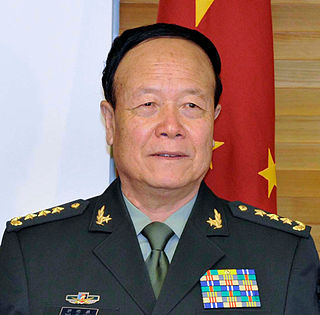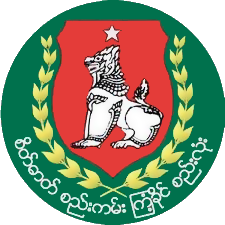Chairman of the Central Military Commission may refer to:
Chairman of the Central Military Commission may refer to:

The Central Military Commission (CMC) is the parallel national defense organization of the Chinese Communist Party (CCP) and the People's Republic of China: the Central Military Commission of the Communist Party of China, a Party organ under the Central Committee of the Chinese Communist Party, and the Central Military Commission of the People's Republic of China, a central state organ under the National People's Congress, being the military branch of the national government.

The general secretary of the Central Committee of the Communist Party of China is typically the paramount leader of China. The general secretary is the head of the Chinese Communist Party (CCP) and the highest-ranking official within the People's Republic of China (PRC). The general secretary is a standing member of the Politburo and head of the Secretariat.
Throughout the history of the People's Republic of China, the position that effectively reigned as the Commander-in-Chief of the Armed Forces changed from time to time. During some periods, it was not exactly clear who was the supreme commander of the People's Liberation Army. Recently, Chairman of the Central Military Commission serves as the Commander-in-chief of the People's Liberation Army. The officeholder is usually the General Secretary of the Communist Party of China as well as the Paramount leader.

In modern Chinese politics, the paramount leader or the supreme leader of the Chinese Communist Party (CCP), the Government of China, and the People's Republic of China (PRC) is an informal term for the most prominent political leader in the PRC. The officeholders are usually General Secretary of the Chinese Communist Party and Chairman of the Central Military Commission. The paramount leader is not, however, a formal position nor an office unto itself. The term gained prominence during the era of Deng Xiaoping (1978–1989), when he was able to wield political power without necessarily holding any official or formally significant party or government positions at any given time.

The Chief of the Army Staff is the head of the military staff of the Indian Army and the chairman of the Indian Army Board. The Chief is usually the highest ranking officer of the Indian army unless the Chief and Vice Chief of Defence are army officers. The position is abbreviated as COAS in Indian Army, and is always held by a four star general. The general is responsible for directing and chairing the army staff of the armed forces serving as the staff's chief executive. As the most senior officer to serve in the Indian Army, the Chief of the Army Staff is a military adviser to the Government of the Republic of India and the Ministry of Defence. The current COAS is General Manoj Mukund Naravane, who took office on 31 December 2019.
The government of the People's Republic of China is collectively the state authority in the People's Republic of China (PRC) under the exclusive political leadership of the Chinese Communist Party (CCP). It consists of legislative, executive, military, supervisory, judicial and procuratorial branches.

The Supreme Commander of the Armed Forces of Democratic People's Republic of Korea is the commander-in-chief of the Korean People's Army, the military of North Korea. The position is vested in the Chairman of the State Affairs Commission in accordance to Article 103 of the Constitution of North Korea.

The General Secretary of the Workers’ Party of Korea is the leader of the Workers' Party of Korea (WPK), the ruling party in North Korea and typically the supreme leader of North Korea. Party rules stipulate that the General Secretary is elected by the party congress. The party leader can also be removed and elected by the party conference and by the Central Committee. The General Secretary is ex officio of the Chairman of the Central Military Commission of the Workers’ Party of Korea and leads the work of the Secretariat. Additionally, the General Secretary is by right of office member of the WPK Presidium, the WPK Politburo and the WPK Central Committee.

The National Defence Commission of the Democratic People's Republic of Korea (NDC) was the highest state institution for military and national defence leadership in North Korea, which also served as the highest governing institution of the country from 1998 until 2016 when it was replaced by the State Affairs Commission.

Li Desheng was a general in the Chinese People's Liberation Army. He was born in Xin County, Henan, China, an area now known as the "Cradle of Generals" for the large number of senior military officers born in the region. He joined the Chinese Workers' and Peasants' Red Army at the age of 14, in 1930, the Communist Youth League in 1931, and the Communist Party of China a year later. He attained the rank of Major General in 1955, and General in 1988. The patterns of Li's advancement suggest that he was mentored by Chen Xilian, and that he was closely aligned with You Taizhong. Li Desheng served on the politburo from 1969–1985, one of the most turbulent periods of the People's Republic. He died in Beijing on 8 May 2011.

Guo Boxiong is a former general of the People's Liberation Army of China. He served as the Vice Chairman of the Central Military Commission, China's top military council, between 2002 and 2012. During the same period he also held a seat in the Politburo of the Communist Party of China, China's top decision-making body. He was expelled from the Communist Party on 30 July 2015. On July 25, 2016, he was sentenced to life imprisonment for bribery.

Zhang Youxia is a general in the People's Liberation Army (PLA) of China and current the second-ranked Vice Chairman of the Central Military Commission of the Central Military Commission (CMC). He previously served as Head of the CMC Equipment Development Department, and its predecessor, the PLA General Armaments Department, from 2012 to 2017. He is the son of General Zhang Zongxun. He is a veteran of the 1979 Sino-Vietnamese War and one of the few serving generals in China with war experience.

The Union Solidarity and Development Party is a political party in Myanmar, registered on 8 June 2010 by the Union Election Commission and currently standing as the largest opposition party in the bicameral Assembly of the Union. It is the successor to the formerly ruling military junta's mass organisation, the Union Solidarity and Development Association. The party was headed by President Thein Sein until 2013, and its headquarters are in Naypyidaw's Dekkhinathiri Township. It is known for its close ties with the military and most of the party officials are former military personnel.

The Cabinet Secretary is the top-most executive official and senior-most civil servant of the Government of India. The Cabinet Secretary is the ex-officio head of the Civil Services Board, the Cabinet Secretariat, the Indian Administrative Service (IAS), and all civil services under the rules of business of the government.

Choe Ryong-hae is a North Korean politician and military officer who is serving as President of the Presidium of the Supreme People's Assembly and First Vice Chairman of the State Affairs Commission since April 2019. He is also a member of the Presidium of the Politburo and Vice Chairman of the Workers' Party of Korea (WPK). He also served as Supreme Leader Kim Jong-un's military second-in-command. He is also father in-law of Kim Jong-un's sister Kim Yo-jong.

The Leading Group for National Defence and Military Reform of the Central Military Commission is a policy formulation and implementation body set up under the Central Military Commission of the Communist Party of China and ultimately answerable to the Central Committee of the Communist Party of China for the purpose of formulating policies related to military reform. The group is headed by Xi Jinping, General Secretary of the Communist Party of China and Chairman of the Central Military Commission.
The office of Vice-Chairman of the Central Military Commission (CMC) functions as the deputy to the CMC Chairman. Currently, two People's Liberation Army generals serve as vice-chairman.

The President of the People's Republic of China, is the ceremonial head of state of the People's Republic of China (PRC). Under the current PRC Constitution, the presidency is a largely ceremonial office with very limited power. However, since 1993, as a matter of convention, the presidency has been held simultaneously by the General Secretary of the Chinese Communist Party, the top leader, also the dictator of this one-party state. The presidency is officially regarded as an institution of the state rather than an administrative post; theoretically, the president serves at the pleasure of the National People's Congress (NPC), the legislature, and is not legally vested to take executive action on his own prerogative.